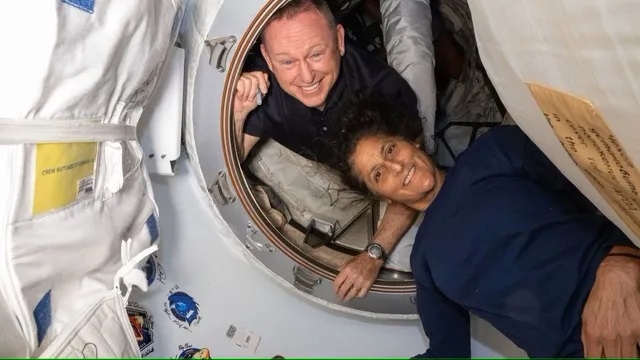Space & the perception of time
| Date :21-Aug-2024 |

By Ruth Ogden :
TWO astronauts
marooned in space may
sound like the plot of a
Hollywoodblockbuster,but for
two NASA crew members, it is
nowareality. Commander
Barry Wilmore and pilot Sunita
Williams are currently in limbo on the International Space
Station (ISS).
They arrived in the Boeing
Starliner spacecraft – the first
testof thespaceshipwithastronauts. Wilmore and Williams
were supposed to stay on the
ISS for around eight days and
return on the same spacecraft.
But there is now debate about
the safety of Starliner after it
experienced helium leaks and
thruster problems on its way
to the ISS. In coming days,
NASA and Boeing may decide
to clear Starliner to carry the
astronauts back to Earth. This
means their staymightnotlast
toomuchlonger.Butifofficials
decide against Starliner, the
astronauts face waiting an
additional six months in orbit
before returning. So how do
astronauts cope with a potential six-month wait for a lift
home?
Waiting for thingsis difficult
at thebestof times.Undernormal circumstances, it is frustrating, stressful and anxietyprovoking. But in extreme situations, with high stakes,
waiting can be purgatory.
Part of the reason that waiting is difficult is that it distorts
our sense of time.
Think of last
time you were waiting for a
delayed train, test results or a
text froma potential new partner. Did it fly by or drag? For
most people, time spent waiting crawls at a glacial pace. As
a result, delays and periods of
anticipation often feel much
longer than they actually are.
Waiting slows our perceptionof time,becauseitchanges
the amount of time that we
spend thinking about time.
During normal daily life we
often ignore time; our brains
havealimited capacity. If time
isn’timportant,wesimplydon’t
think about it, and this helps
it to pass quickly.
Waiting also slows our perceptionof timebecauseitwhat
wedo andhowwe feel.Normal
life is busy and full of everchanging activities and interactions. The sudden need to
wait halts the flow of life, often
leaving us with nothing else to
do, thus increasing levels of
boredom and frustration.
In general, time filled with
activity passes more quickly.
We all got a taste of this during COVID lockdowns.
When
we were stuck inside unable to
see friends and engage in normal daily activities, the loss of
routineanddistractionscaused
time to drag for many.
For the astronauts stuck on
the ISS, anxiety about when
theywillreturn,limitedopportunities for activities and fewer opportunities to contact
friends and families combine
to make their wait to return
home feel significantly longer
than six months - if it should
come to that.However, as academicswhoresearch theeffects
of time on human psychology
and biology, our ongoing work
withcrewmembersatresearch
stations in Antarctica aims to
shed light on whether waiting
inextremeenvironmentsisdifferent to waiting during normal daily life.
A year in Antarctica
While being stuck for six
months on the ISS may sound
likemanypeople’sworstnightmare, it is not uncommon for
scientists to spend long periods isolated and confined in
extreme environments. Every
year, organisations such as the
Instituto Antártico Argentino
(which uses the Belgrano II
Antarctic station), the French
Polar Institute and the Italian
AntarcticProgramme,incooperation with the European
Space Agency (which all use
Antarctica’sConcordiastation),
send crews of people for up to
16months toconductresearch
on the frozen continent.
During theMarch toOctober
polar winter, teams spend six
monthsin near darkness – and
from May to August, in completedarkness– facingoutside
temperatures of up to -60C,
wind speeds of 160 km/h (100
mph) and storms which prevent almost all outdoor activity.
Limited Internet coverage
canalsopreventconstantcommunication with the outside
world.For thelast year,wehave
researched how life in
Antarctica influences people’s
experience of time. Each
month, we asked crew members how time felt like it was
passing in comparison to
before their mission. Trapped
on base, with limited contact
with the outside world, you
might expect time to drag.
However, our results suggest
the opposite may be true. Analysis of crew members’
experiences indicated that
being constantly busy with
complex tasks such as scientific research helped time to
pass swiftly, according to 80%
of crew responses. Only 3% of
responses indicated that time
actually dragged, and these
reports occurred when nights
were long and there was little
to do. These experiences may
provide hope for those stuck
on the ISS.